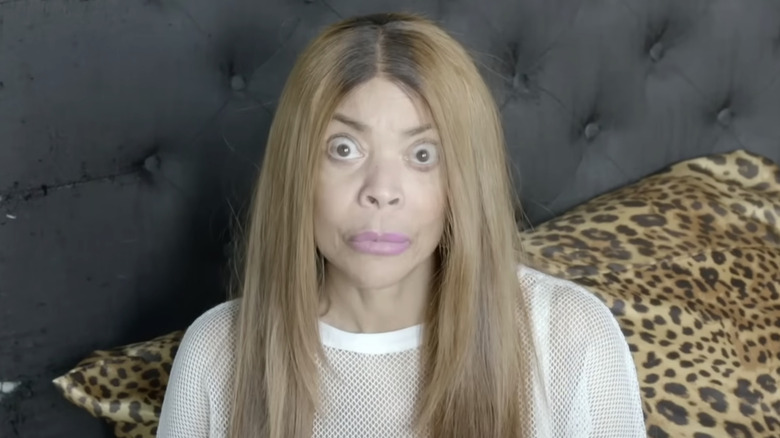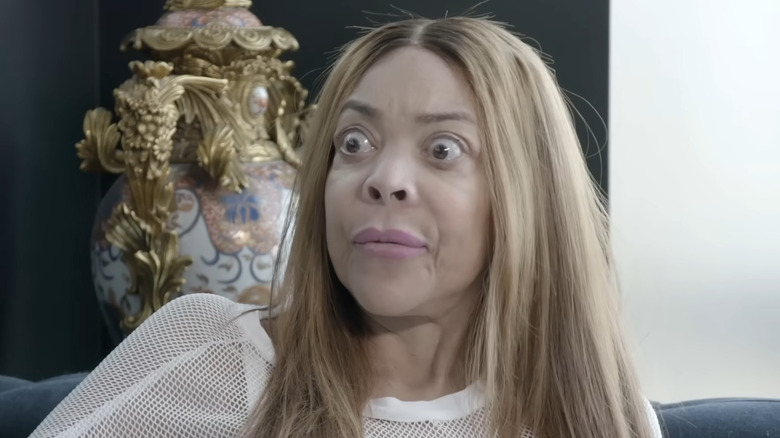What Happened To Wendy Williams' Eyes?
Fans have been worried over Wendy Williams since her unceremonious exit from the public eye. The beloved host of "The Wendy Williams Show" saw her program come to an end in 2022 after a 13-year run, with reports attributing the cancelation to a series of health issues faced by the former host. Before its axing, Williams had taken several breaks from her hosting duties due to various medical concerns, including a 2018 diagnosis of Graves' disease and hyperthyroidism, a shoulder fracture in 2019, and "ongoing health issues" in 2021, which ultimately prevented her return. Concerns for the host intensified after the release of the "Where is Wendy Williams?" documentary, where she appeared to exhibit signs of cognitive difficulties and noticeable eye protrusion.
It didn't take long until her team released a statement clarifying the state of the star. In a lengthy press release, they confirmed that Williams had indeed been riddled with a string of medical conditions and even received a new diagnosis similar to that of Bruce Willis'. "After undergoing a battery of medical tests, Wendy was officially diagnosed with primary progressive aphasia and frontotemporal dementia (FTD). Aphasia, a condition affecting language and communication abilities, and frontotemporal dementia, a progressive disorder impacting behavior and cognitive functions, have already presented significant hurdles in Wendy's life," the statement read.
But the change in her eye appearance apparently has less to do with FTD. Per Williams herself, her eye condition is more closely associated with her previously diagnosed Graves' disease.
Her bulging eyes are caused by Graves' disease
Wendy Williams' eye situation already became the talk of the town back in 2018, right around the time she received a double diagnosis of Graves' disease and hyperthyroidism. The host discussed her condition on-air, breaking down the condition to her audience. "My thyroid has been totally cattywampus and that is the eye thing that you all have been seeing. You caught it before I did," she explained at the time (via CBS News). "My thyroid, my hyperthyroid is attached also to Graves' disease. Graves' disease squeezes the muscles behind your eyeballs and so that's the reason for [the bulging of my eyes]." Despite her doctor's orders for a three-week timeout, she promised to come back to the show sooner. "I'll be back in two. I'm not an heiress. Who's gonna pay my bills?" she quipped.
The National Institutes of Health notes that 1 in 100 Americans have Graves' disease, including celebrities like rapper Missy Elliott and former President George H.W. Bush. Per Dr. Terry Jay Smith, an endocrinologist and professor at the University of Michigan Medical School, eye inflammation and protrusion are common symptoms for many with the condition. "About half of the people with Graves who develop over-activity of the thyroid also develop a very peculiar process around the eye which causes the eye to become inflamed and to bulge," he shared with NBC News. Williams' case has been particularly noticeable, but according to her family, she is making progress toward recovery.
Wendy is reportedly on the mend
The release of the "Where is Wendy Williams?" documentary understandably raised concerns among fans over her seemingly fragile state, but the good news is she is reportedly well on her way to bouncing back. Speaking with Us Weekly, her brother, Tommy, shared that the host is still getting treated in a facility and that her condition has significantly improved compared to what was shown on TV. "When I speak to Wendy she sounds fine. Wendy has improved. I know my sister from where she was to where she is now, and she has a substantial amount of improvement. It's dialogue and conversation, topics, content, speech pattern, everything," he said. "The past was obvious. We saw it," he added. "She was in a worse state, and the [documentary] movie depicted it. Now [she is in] a different state."
Even Williams herself broke her silence, primarily to thank fans for their support, especially when many sent their well wishes her way after her FTD diagnosis was made public. "I want to say I have immense gratitude for the love and kind words I have received after sharing my diagnosis of Aphasia and Frontotemporal Dementia. Let me say, wow! Your response has been overwhelming," she said in a statement to AP. "The messages shared with me have touched me, reminding me of the power of unity and the need for compassion."



